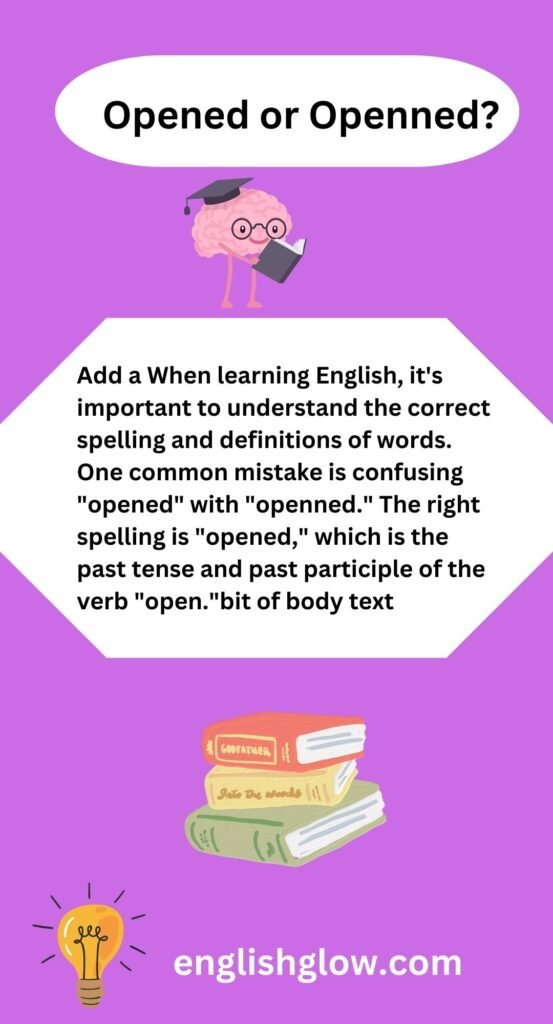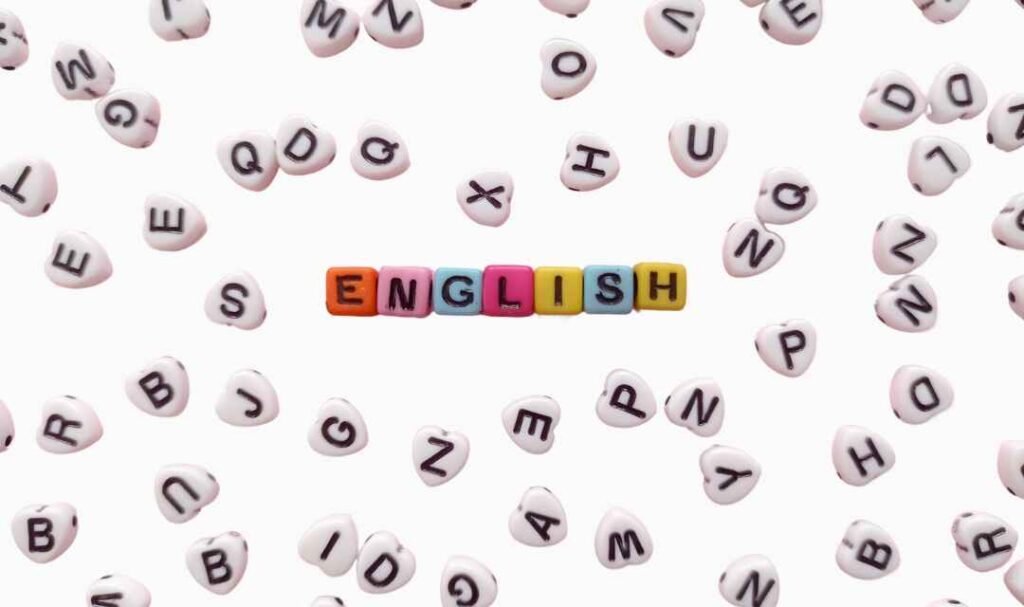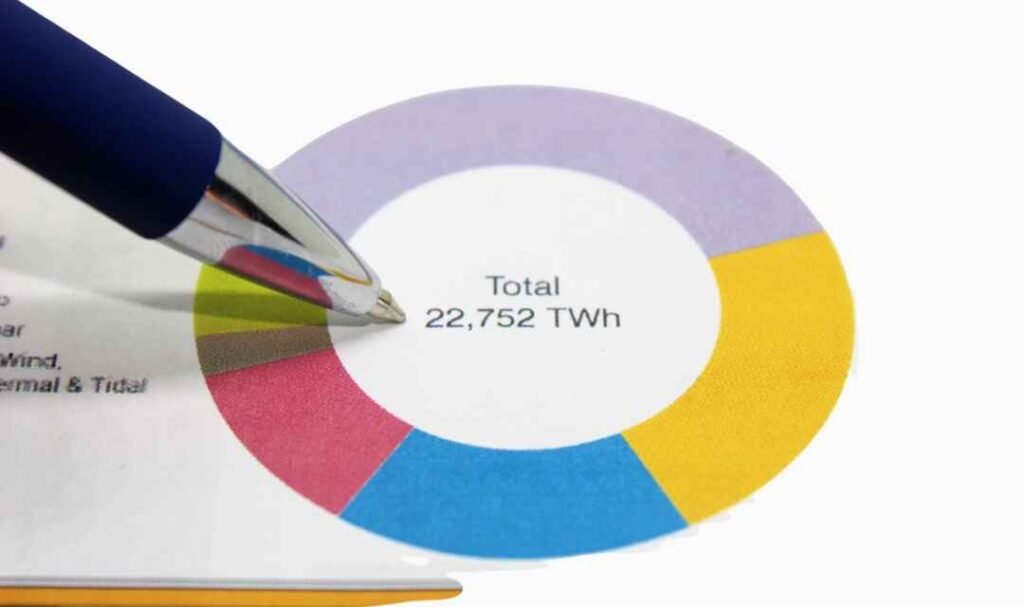In the realm of writing, precision in spelling is not just a technicality—it’s a cornerstone of effective communication. Consider the word opened: a simple, correctly spelled term that conveys action or accessibility. It’s a word we use effortlessly in sentences like, “She opened the door with a smile,” evoking imagery and emotion that resonate with readers. On the flip side, the misspelled openned is a linguistic misstep, a deviation that can disrupt the flow of your writing and distract your audience. It’s a reminder that even small errors can undermine the clarity and impact of your message.
Mastering the nuances of English spelling and grammar is more than an academic exercise—it’s a skill that shapes how your ideas are received. Knowing when to use opened instead of the incorrect openned isn’t just about avoiding mistakes; it’s about crafting sentences that feel natural, engaging, and easy to understand. Imagine reading a heartfelt letter or a compelling story only to stumble over misspelled words—it breaks the connection between the writer and the reader. This is why educators and language experts emphasize the importance of attention to detail. By honing your spelling and grammar, you not only avoid confusion but also create a seamless, enjoyable experience for your audience. After all, clear and polished writing is a gift to your readers, inviting them to fully immerse themselves in your words.
Understanding the Right Spelling

Mastering the English language involves paying close attention to the nuances of spelling and definitions, as even small errors can lead to confusion. One such common pitfall is the mix-up between “opened” and “openned.”
The correct spelling is “opened,” which serves as both the past tense and past participle of the verb “open.” It is used to describe actions that have already taken place, such as “She opened the door” or “He opened the box.” These simple yet vivid examples help us visualize moments from everyday life, making the concept relatable and easy to grasp.
In educational settings, teachers emphasize the significance of proper grammar and spelling, as they are the foundation of effective communication. Imagine the frustration of misreading a message or the satisfaction of crafting a perfectly clear sentence—these experiences highlight why accuracy matters.
By understanding the correct usage of words like “opened,” learners can avoid errors that might obscure their intended meaning. This clarity not only enhances everyday conversations but also fosters professionalism and confidence in written and spoken expression. After all, the ability to communicate accurately is a skill that resonates deeply, whether in personal interactions or professional endeavors.
Open or opened?
| [su_highlight background=”#c7ff58″]Word[/su_highlight] | [su_highlight background=”#c7ff58″]Part of Speech[/su_highlight] | [su_highlight background=”#c7ff58″]Meaning [/su_highlight] | [su_highlight background=”#c7ff58″]Example[/su_highlight] |
|---|---|---|---|
| Open | Adjective | Not closed; describes a state. | “The car stopped when I realised the door was open.” |
| Opened | Verb (Past Tense) | Describes an action that has already occurred. | “She opened the window and immediately looked at the clock.” |
| Opening | Noun | Refers to a space or gap allowing passage or access. | “An aperture in a roof that lets out smoke.” |
| Opening | Adjective | Describes something at the beginning of an event or process. | “An opening remark that stole the show.” |
Everyday Language and Usage
In the tapestry of everyday language, the word opened weaves itself seamlessly into countless scenarios, becoming a familiar and effortlessly accessible part of our daily interactions. Imagine, for instance, a warm evening where a host graciously says, “She opened the door and welcomed the guests,” or a child’s eager curiosity as “He opened the box to see what was inside.” These phrases, though simple, carry a quiet power, resonating deeply in the rhythms of our conversations.
In classrooms, teachers often emphasize the significance of using words with precision, as it is the cornerstone of clear and effective communication. Mastering the correct usage of opened not only sharpens your expression but also unveils the true essence of your thoughts, making your ideas shine with clarity. Whether in casual chats or formal discussions, understanding when and how to use opened can transform the way you connect with others.
At its heart, this is more than just a grammatical rule—it’s a tool that empowers you to express yourself with confidence and authenticity. By embracing these foundational principles, you not only communicate more effectively but also enrich the shared human experience of language.
Usage in Business and Technology
n the dynamic realms of business and technology, the term opened holds profound significance. Imagine the excitement and anticipation when a company proudly announces that it has opened a new branch in a bustling city or the sense of achievement when a business activates cutting-edge systems and applications. These milestones are not just operational successes but also moments of growth and innovation, often described using this versatile word. For students venturing into these fields, mastering the appropriate language is crucial, as clear and precise communication forms the backbone of professionalism.
Similarly, in the ever-evolving world of technology, opened frequently finds its place in the launch of new digital platforms or services. Picture the meticulous effort behind designing a user-friendly app interface or the intricate processes involved in developing sophisticated software. Describing these advancements accurately is essential, as it reflects the dedication and expertise of the professionals behind them. Whether in the boardroom or the tech lab, the choice of words like opened helps convey actions and intentions with clarity, leaving a lasting impact in these competitive fields.
You might enjoy reading: What Kind of vs What Kinds of? Insightful Update in 2024
Key Point: Avoiding Common Spelling Mistakes
It’s easy to mix up words like “opened” and “openned” due to a simple typo or spelling mistake. However, knowing the right spelling is important to ensure your writing is clear.
“Opened” is the correct past tense and participle of the verb open. An extra “n” can happen by accident when typing, but it’s a key detail to avoid. Always read and check your work to catch these common mistakes.
For instance, “He opened the window and immediately looked at the clock” uses the correct spelling of “opened.”
The wrong version, “openned,” is simply incorrect. By paying attention to these details, you can avoid simple errors and improve the clarity of your communication.
The Role of “Opened” in Literature and Art

In literature and art, the word opened is often used in a metaphorical sense to show the power of words in revealing feelings and ideas.
For example, a book that has “opened” new imagination for readers or an artist who has “opened” a new exhibition that sparks conversation about social issues.
These uses of opened are not just important for their literal meaning but for their ability to reveal deeper literary and artistic works.
In classes, teachers talk about how opened can be a powerful tool in writing and art.
It teaches students to think critically about how words can open up new places for thought and reflection.
This metaphorical use of opened makes literature and art come alive, evoking strong emotions and making a lasting impact on people.
How “Opened” Shapes Sports and Events

Whether it’s the opening ceremony of the Olympic Games, the kick-off of the FIFA World Cup, or the beginning of the Super Bowl, these moments are filled with excitement as nations, teams, and athletes take the stage.
These events are not just about competition but also about celebrating culture, art, and unity on a global scale.
At the same time, opened has a significant role in the business side of sports and events. Exhibition halls at trade shows are opened to showcase the latest products, ideas, and services.
Businesses hold ribbon-cutting ceremonies to mark new beginnings, bringing professionals and customers together in a shared experience.
From the pumped atmosphere of sports matches to the thrill of new discoveries in exhibitions, the word “opened” signifies progress, growth, and the start of unforgettable experiences.
How to Improve Spelling Skills and Avoid Mistakes?
Improving spelling skills can be achieved through several effective methods. Regular reading of materials like books, articles, and newspapers helps to reinforce the correct spellings and usage of words.
Whenever in doubt, it’s wise to consult a dictionary to confirm the proper usage. Practicing with exercises, quizzes, and word games can also enhance your proficiency and understanding of spelling rules, including suffixes, prefixes, and the origins of words.
Feedback from teachers, peers, or language experts is valuable for improvement and guidance. Utilizing spell-check tools in word processing software or online can help catch errors early.
Adopting these strategies into your daily routine will reduce the likelihood of using incorrect words like “openned” and will significantly enhance your spelling abilities over time.
You might enjoy reading :How Are You Fairing or Faring? Insightful Update in 2024
What does the idiom open to mean?
When it comes to understanding idioms, it’s essential to grasp their meanings in the right context. The phrase “open to” is a common idiom that can have various interpretations depending on the situation.
Generally, it means being receptive, willing, or accepting of new ideas, suggestions, or experiences. For example, someone might say they are “open to trying different cuisines,” which means they are eager to explore new tastes and flavors.
Another interpretation of “open to” relates to something being available or accessible. A park that is “open to the public” means it is ready for anyone to enter and use.
To better clarify the meaning of this idiom, you might say, “The specific section of the library is open to everyone,” which clearly indicates that the area is accessible to all.
What is the phrasal verb of open?
When thinking about the word “open,” it’s useful to understand it as a phrasal verb like “open up.” The meanings of these phrases can change depending on the context.
For example, when a store is said to open or “open up” at 9 AM, it means it begins operation at that time.
But if someone says they are starting to open up about their feelings, they’re revealing or disclosing what they truly feel inside.
This concept also applies when considering spaces like a garden that is “open to the public.”
Here, “open” means the space is accessible and ready to be explored.
Examples can vary based on how the phrase is used—whether it’s about something becoming available or someone being ready to expand and unfold their thoughts into view.
Conclusion
When considering whether your metal roof will produce noise during rainfall, it is essential to recognize how proper installation can significantly mitigate this concern.
Much like ensuring the correct spelling of “opened” in written communication, the meticulous installation of a roof guarantees its optimal functionality. In both scenarios, clarity and precision in execution are paramount—whether the goal is to convey a message effectively in language or to diminish the sound of rain echoing on a roof.
Across diverse domains such as business, technology, or literature, mastering the appropriate use of words—or, in the case of roofing, materials—is indispensable. Just as in art or sports, where the finesse of execution directly influences the result, paying close attention to detail ensures that a roof performs as intended. This not only safeguards the space beneath it but also creates a serene and tranquil environment, even during the heaviest downpours.
You might enjoy reading: Copys or Copies: Differences + uses and Examples



